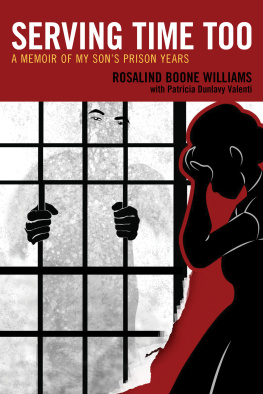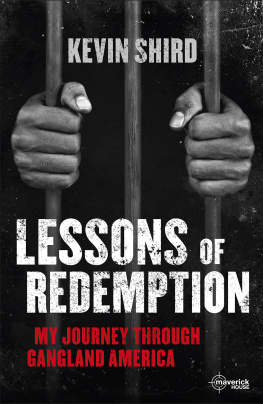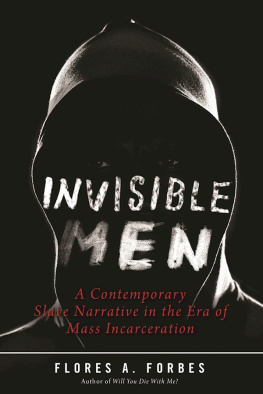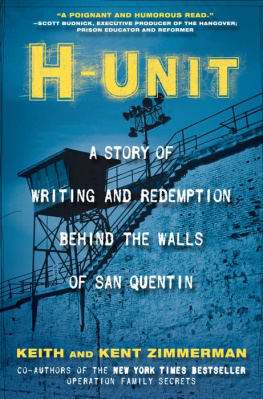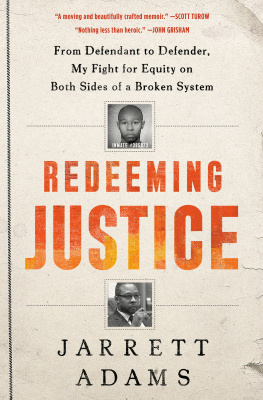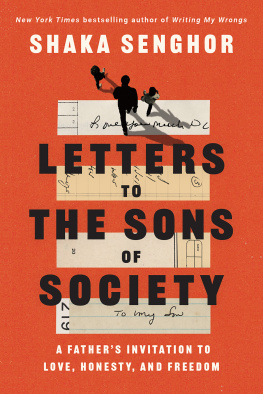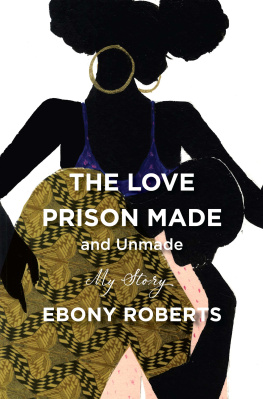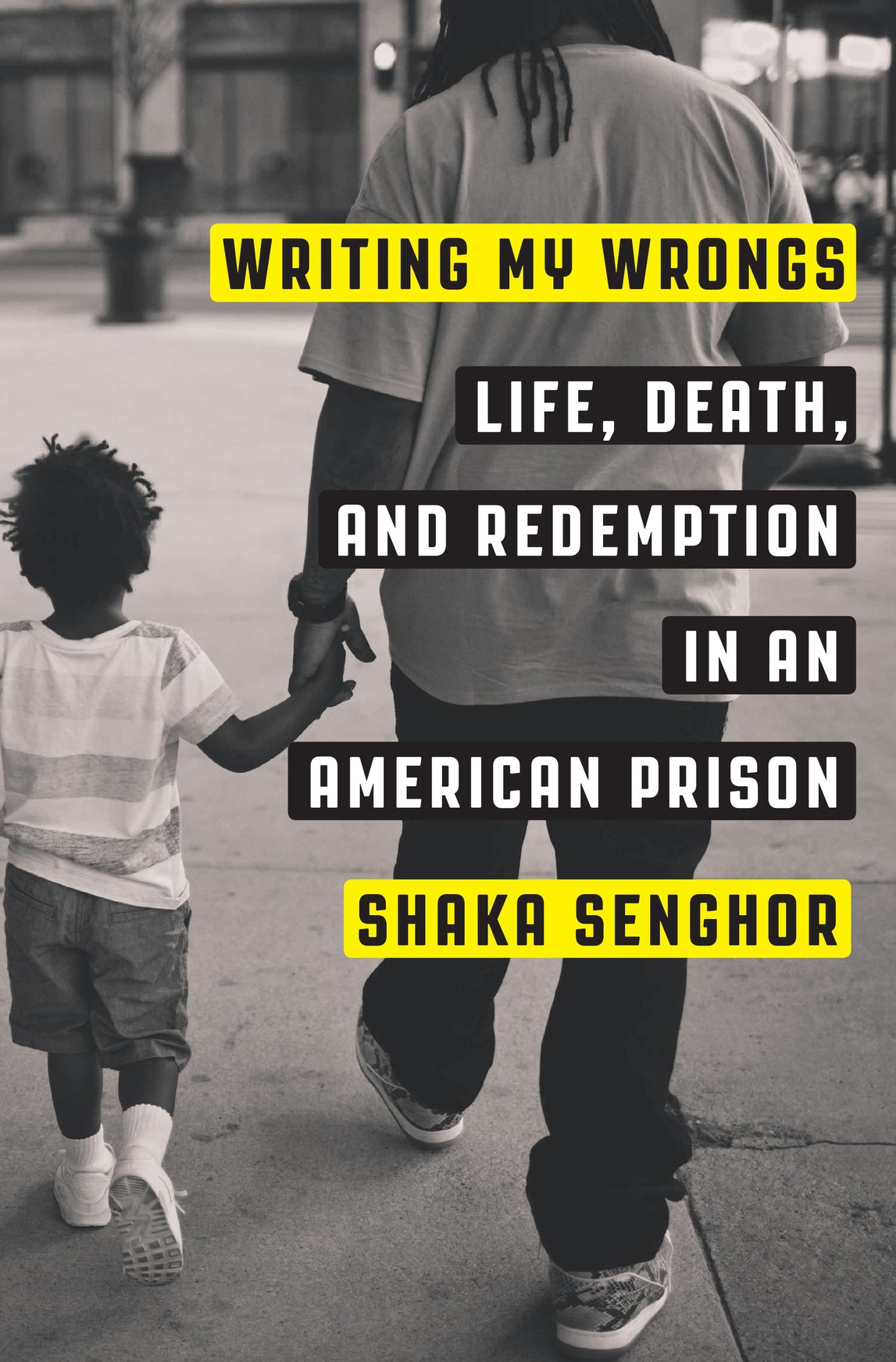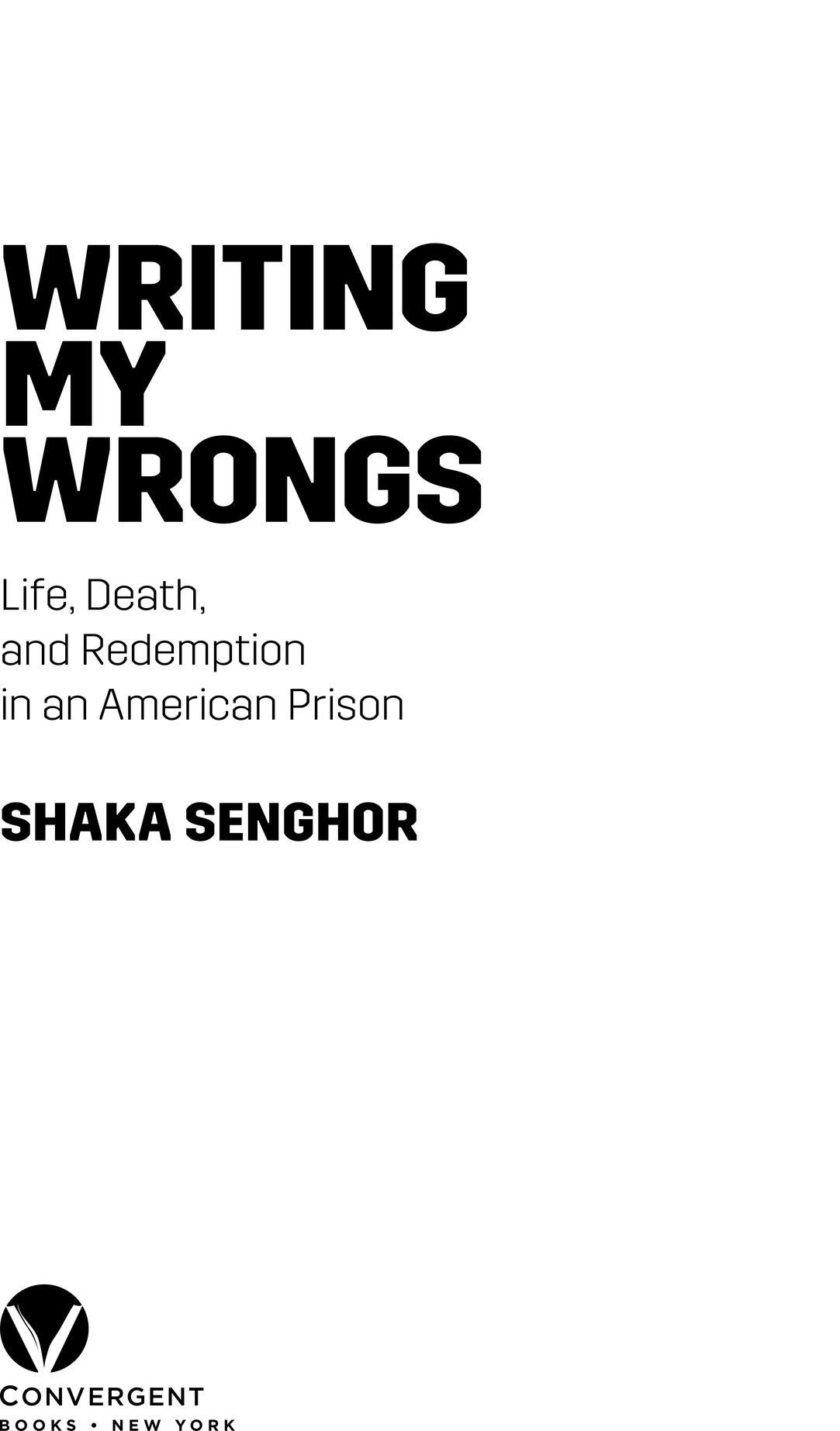Copyright 2013, 2016 by Drop a Gem Publishing, LLC
All rights reserved.
Published in the United States by Convergent Books, an imprint of the Crown Publishing Group, a division of Penguin Random House LLC, New York.
www.crownpublishing.com
CONVERGENT BOOKS and its open book colophon are registered trademarks of Penguin Random House LLC.
Originally published by Drop a Gem Publishing, LLC, in different form, in 2013. Selected material originally appeared on the authors blog at medium.com/@shakasenghor.
Library of Congress Cataloging-in-Publication Data is available upon request.
ISBN9781101907290
eBook ISBN9781101907306
Cover design by Christopher Brand
Cover photograph by Northbound Films
v4.1_r1
ep
Contents
To Ebony, thank you for everything you do to support
my dream and vision. You are my rock, and I deeply appreciate you for being the rare jewel of a woman that you are.
You truly are my everything, and its an honor to be sharing
this journey with you.
To my children Lakeisha Todd, James Angelo White II, and
Sekou Senghor, I love you more than words can express.
To my parents James and Marie White and Ronald (RIP) and Arlene Howard, thank you for your love and support.
To my brothers on lockdown who are working hard
to make a difference and transform their lives,
you inspire and motivate me.
To the victims of crimes throughout the world,
your pain will never be forgotten.
The unexamined life is not worth living.
Socrates, Platos Apology
FOREWORD
On July 1, 2012, the MIT Media Lab announced that we would be creating an Innovators Guilda team of scholars, executives, and designers that would go to communities around the world using the power of innovation to help people. Our first focus was Detroit.
Three weeks later the Knight Foundation, which was funding our trip, organized a meeting with the citys community leaders. We gave presentations about MIT and the Media Lab and about how we had come to Detroit to explore how we could create innovative solutions to long-standing problems.
Then, during the Q&A, a tough-looking Black man with dreadlocks stood up. Many well-meaning people come to Detroit with a missionary mentality, he said. Then they get discouraged when they realize just how tough our problems are. If you want to make a real impact, you have to go out among the people in the communities and not buy into the romanticized view of Detroit based on midtown and downtown. Although there were other comments expressing skepticism toward our efforts, this one stood out. We realized we were staring reality in the face.
After the meeting, the man introduced himself as Shaka. He said that if we were willing he would show us the real Detroit. We immediately accepted the offer. On our next trip, we avoided downtown altogether and went straight to Brightmoor on Detroits West Side, a neighborhood full of burned-out, vacant homes and liquor stores fronted with bulletproof glass. Shaka told us stories that had none of the romance, but they were true.
We quickly realized that we couldnt just fly in, do good, and go home. We needed to introduce ourselves to the community, learn about the people who lived there, and build trust. If we wanted to have a positive impact on Detroit, we had to be there for the long haul.
In the following weeks, my team from the Media Lab and creatives from the design firm IDEO flew to Detroit, working with Shaka and others to come up with a plan for how we might be able to join the community and work together. We then invited Shaka and the Detroit team to the MIT Media Lab to meet students and faculty and see and learn about what we do. Bonds began forming between the Lab and the Detroiters.
In October, we all converged on Detroit, setting up a base at the headquarters of OmniCorpDetroit, a vital local organization. We were an eclectic group of community leaders, chief innovation officers, students, and designers. Each team started working on projects ranging from solving the streetlight issue to urban farming. Shaka emerged as our natural leader, keeping the energy high and the teams working together.
By the end of an insanely productive three days, I had a plan. I would make Shaka an MIT Media Lab Fellow. Hed be our man in Detroitour connection to the incredibly important world he represents. Since then, Shaka and the Media Lab team have started to work together extensively, and Shaka continues to inspire and challenge us.
In December, Shaka e-mailed me that he had a rough draft of his memoirs and asked if I was interested in reading it. I read the entire book in two sittings. Shaka is, among his other talents, an amazing storyteller. The book is funny and moving and astute, and by the end I felt as if I had been the one convicted of murder, as if Id spent seven years in the hole, and gone through the dramatic transformation from angry, scared young boy to enlightened teacher and leader.
And by the end, I could begin to see how a generation of bright children full of promise are channeled into a system that sees them as little more than felons-in-waiting. Yet again, Shaka has inspired me to help right the wrongs, in this instance by helping him write the wrongs.
The book may be about Shakas past, but it points to a future in which we all take the next step to build a more just society.
Joi Ito
Director, MIT Media Lab
January 2013
PROLOGUE
OAKS CORRECTIONAL FACILITY
Manistee, Michigan
2001
I stared at the mirror, watching the tears roll slowly down my face, each drop carrying the pain of my childhood. I was on my second year of a four-and-a-half-year stint in solitary confinement. It was my deepest moment of reflection, a sacred moment of clarity when I came face-to-face with true forgiveness.
I walked over to the steel sink-toilet combo that was next to my cell door. The cell was spartan in appearance, with a brick slab and a plastic green mattress for a bed. The mirror was a sheet of polished steel, because in prison they didnt allow real mirrors.
I stared at the battle-scarred image in front of me and knew I needed to begin the long, tedious process of making peace with my past. I opened up deep wounds that had been stuffed with the gauze of anger and self-hatred. I forgave all of the people who had teased me in my childhood, making fun of my jack-o-lantern-sized head by calling me Pumpkin. I forgave everyone who had made fun of my gap-toothed smile. I ran my hands through my long dreadlocks and forgave everyone who ever called me nappy-headed, making me feel insecure about the crown my Creator had bestowed upon me. The words from my past ricocheted around in my mind like errant bullets, hurting no less now than they had back then.
I forgave my mother for all of the ass whoppings she gave me, remembering the fire of the belt cutting into my tender flesh. I forgave her for all of the moments she wasnt there when I needed her. I forgave the guy who shot me when I was seventeen and made me feel like I had to carry a gun. I forgave my siblings and homies for abandoning me at the lowest point in my life.


